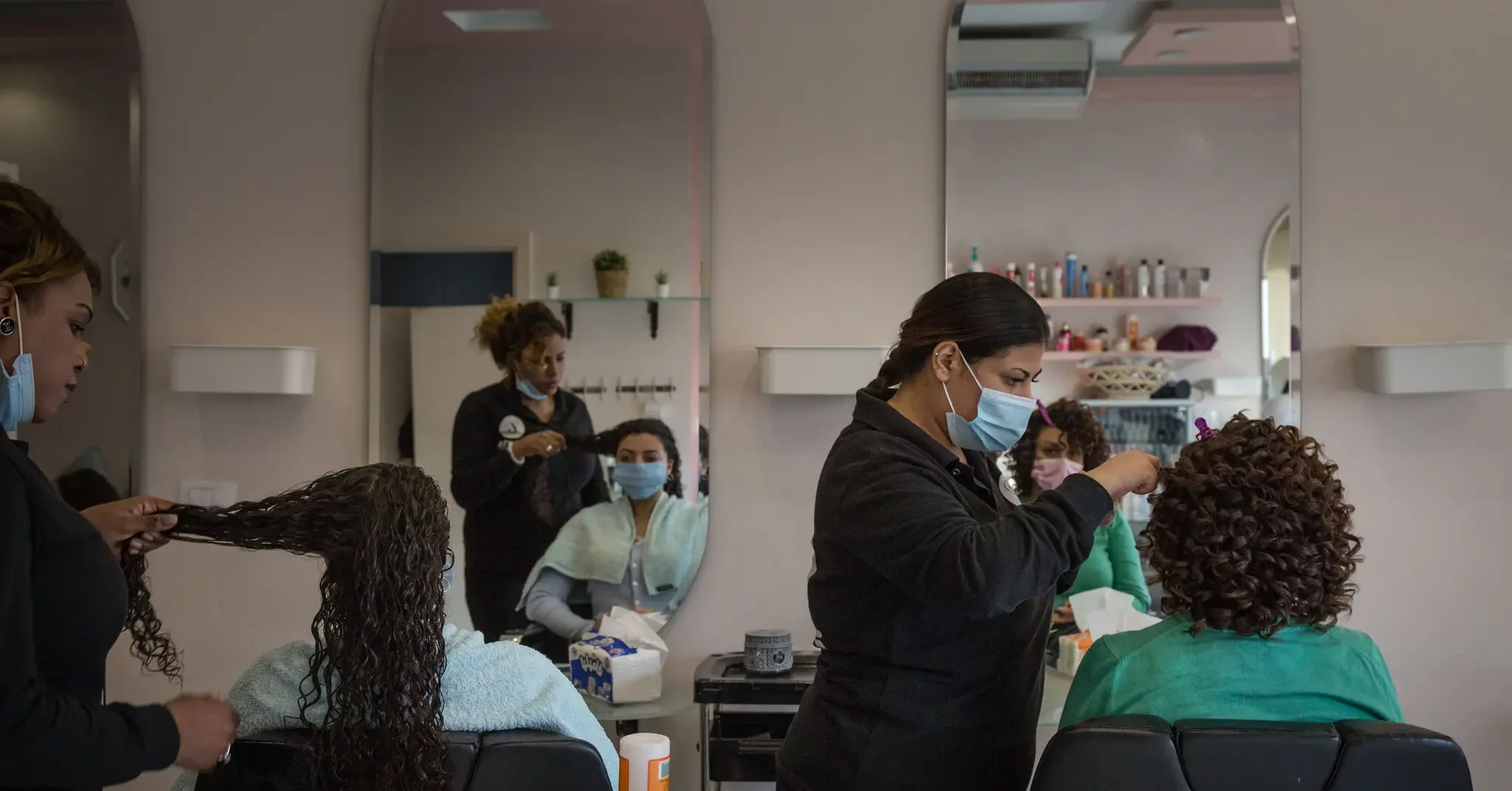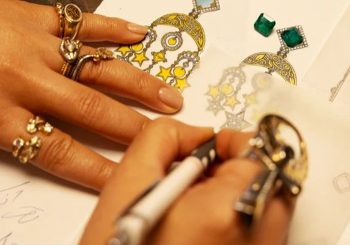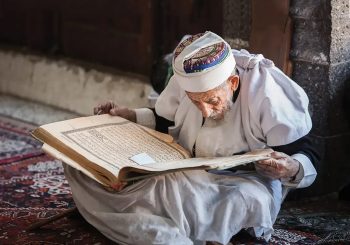Staring in the mirror, trying to tame her hair, Fatma Yasser wondered if her natural curls were, in fact, “too wild,” as her aunt told her. The 26-year-old marketing specialist straightened her hair for years before she felt confident enough to embrace her natural hair.
“When I first stopped straightening it [hair], my own relatives told me I looked unkempt and asked why I wasn’t making an effort to look presentable,” Yasser told Egyptian Streets.
For years, straight hair was held up as the ideal, pressuring women to use heat and chemical treatments to conform. Curly and kinky textures were often viewed as unprofessional or undesirable, long-standing at the center of racialized beauty standards, a perception reinforced by social expectations.
However, in recent years, a growing number of beauty salons and curly hair care brands, such as Curlit, Jovialty’s Curl Wonder, and The Hair Addict, a natural hair advocate, have helped women embrace their natural curls by offering guidance and products.
Social media has also helped by creating communities that support hair care and fight discrimination, such as Curled by M, Curld by Sabrina, and Curly Talks, by showcasing confident women.
“Curly hair is part of our identity,” said Sara Safwat, founder of Egypt’s first natural hair salon in 2018, the Curly Studio, noting that around 80 percent of Egyptians have curly or wavy hair, but that identity has faded as many have turned to straightening.
“I usually shave my head,” Kareem Aladdin, 31, an Engineer, told Egyptian Streets. “But when I was younger, I was told that my coily hair was ‘messy’ whenever my hair grew longer.”
He was often told to avoid the sun to keep from getting darker, and some even suggested skin-whitening products. “It made me feel like having darker skin was something to be ashamed of,” he said.
Although Ramy Aly, an Assistant Professor at the American University in Cairo (AUC), was described by a London loctician as looking “quite Caucasian,” he wears his hair in dreadlocks. Aly, who has studied hair culture in Egypt, shared experiences of discrimination based on his hairstyle, and through his research, he linked these biases to a broader societal pressure toward “whitening.”
The Root of Racist Beauty Standards
Racism in Egypt, while seldom addressed publicly, is reflected in pervasive societal beauty standards that favor Eurocentric traits such as lighter skin, straight hair, thinner lips, and narrow noses, while marginalizing Afrocentric features, including darker skin tones, curly hair, fuller lips, and broader noses.
Deeply rooted in historical and cultural contexts, Egypt’s history of colorism and anti-blackness dates back centuries, influenced by colonialism, slavery, and elite cultural norms, according to a 2021 paper by Islam Bara’ah Sabry, an Egyptian research associate.
“During the eras of the Fatimids, Ayyubids, Mamluks, and Ottomans, Egypt was home to a diverse mix of ethnic groups,” historian Amina Elbendary had told Egyptian Streets.
She noted that Egypt has long been home to a diverse mix of races and ethnicities, where people of various backgrounds co-existed. During the Mamluk era, the ruling elite largely consisted of white enslaved individuals taken from Asia Minor and the Balkans to serve as soldiers. However, black individuals were subjected to enslavement for domestic work and military service, which led to forms of discrimination that remain regrettably underrecorded in historical sources.
During the Ottoman Empire in Egypt, the dominance of fair-skinned elites, followed by European colonial powers, helped cement a lasting link between whiteness and the upper class in Egypt. The historical dynamic also contributed to the perception of darker skin as being tied to laboring or subservient social roles.
Elbendary’s statements are supported by the 2021 paper, which states that the historical association of darker skin with inferiority laid the groundwork for present-day colorism, in which lighter skin continues to be tied to elevated social standing and desirability.
Egyptian media have also played a significant role in perpetuating these biases.
Darker-skinned individuals, particularly those with Afrocentric features, are frequently depicted in subservient roles such as inferior jobs as doormen, housemaids, clowns, and servants to wealthy families. This stereotyping reinforces societal prejudices and marginalizes darker-skinned Egyptians and African migrants, according to a 2023 study.
“If you look at old movies, the rich, desirable women always have light skin and European features, while darker-skinned characters are often cast as servants. Even now, advertisements mostly feature models who fit that mold,” Yasser notes.
Additionally, racist caricatures and derogatory language targeting Afro-Arabs and Black African migrants appear on television screens across the Arab world
The Egyptian comedy series Azmi we Ashgan (Azmi and Ashgan, 2018) featured lead actors repeatedly appearing in blackface, using racial slurs, including the n-word –racial slur, a word largely considered inappropriate and offensive. The series depicted black characters as servants who speak broken Arabic and engage in sorcery, sparking debate on X.
Such portrayals are not new to Egyptian media.
In the Egyptian film Sa’eedi fil Gamaa el Amrekeia (An Upper Egyptian at the American University in Cairo, 1998), the main character tells a black prostitute, “Why are you turning off the light? You are already dark by nature.”
In the 2001 film, Africano, the lead character says, “Is there a power cut in there or what?” upon seeing a group of black people walking out of a nightclub. Looking at a family photo in the apartment of a Sudanese man, played by an Arab in blackface, three characters in the film Eyal Habiba (Lover Kids, 2005) laugh as one of them says, “Did someone burn this apartment before or what?”
Everyday Racism and Microaggressions
Ridicule and mockery of a person’s color is experienced firsthand by Aladdin. He said, “Racism exists in Egypt but is often disguised as a joke. People just don’t notice it because they’re used to it.”
Aladdin recalled being called chocolate, Eswed, which means black in Arabic, and Zengy, which is the Arabic translation of the n-word, a racial slur, also largely considered inappropriate and offensive.
“Racism in Egypt is rarely discussed, but it’s real,” Yasser confirmed. “Lighter skin comes with pretty privilege, certain features are idolized.
Yasser added that racism also appears in the workplace, where curly or coily hair is deemed improper, and darker-skinned employees are often overlooked for customer-facing roles, even when more qualified.
Aladdin agreed, noting that fair-skinned people are taken more seriously in leadership roles, and racism is common in professional settings. “People have jokingly asked me if I’m Sudanese, as if it’s an insult, or directly called me ‘Zool,’” he said, noting that while the word means “man” in Sudanese Arabic, it’s often used sarcastically, leading him to believe it carries negative connotations.
Being on the receiving end of microaggressive comments is not unfamiliar to Yasser. She shared that people sometimes touch her hair without permission, or ask to touch it because it is “fluffy.”
“Then they say, ‘you should tame it,’” she said, noting how in the past, such comments affected her negatively. “Now, seeing more women embrace their natural hair texture, I feel confident and comfortable.
Yasser stressed the importance of recognizing and remembering that beauty is not defined by outdated societal standards.
“Society’s standards will change, but self-acceptance is what really matters,” Aladdin mirrored Yasser’s sentiment. “Your worth isn’t in your skin tone or hair type.







Comments (0)